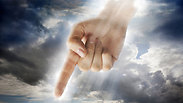
Loving God’s imperfect role
Op-ed: How can we reconcile faith in a Creator able to craft the Milky Way and who nevertheless allows thousands of toddlers to be gassed? This question is as relevant today as it was seven decades ago.
In Judaism the adulation of religious figures is tempered by scriptures that portray patriarchs and prophets as marred by flaws and soiled by sin. This approach deterred Jews during centuries from being drawn to personality cults and idolatry. This is all the more remarkable given that human fallibility never invalidated the reverence and obedience owed to the founders of the Jewish faith.
Enclaves of fundamentalism and fanaticism within the fold nowadays call for Jews to take a further step along the path of pragmatism. The time is ripe to challenge the assumption that God's actions in the world are perfect.
Individuals who grapple with theodicy in general and the Holocaust in particular often come to the conclusion that God does not exist. This conclusion is understandable given the scale of suffering inflicted upon millions in Auschwitz.
Nevertheless, as Immanuel Kant remarked over 200 years ago, the wonders of nature are powerful proof that God exists. How can we reconcile faith in a Creator able to craft the Milky Way and who nevertheless allows thousands of toddlers to be gassed? The latter question is as relevant today as it was seven decades ago.
Believers must dare to think the unthinkable and come to terms with faith in a God that acts imperfectly. In a God who is wise and caring enough to create the seas, but insufficiently merciful to rescue populations from tsunamis. In a God who brings His people out of Egypt and drives them to Treblinka and Majdanek. In a God who bestows blessings and curses, and doses darkness and light in imperfect amounts.
There are two main objections to the notion of a God that acts imperfectly. The first professes ignorance and accepts evil as part of God’s inscrutable wisdom. Personally, I find little solace in inscrutability given that it demands from us a selective suspension of judgment over divine actions.
The second objection is that a God that acts imperfectly cannot be God by definition. The latter objection is foreign to Judaism: Did the patriarchs cease to be patriarchs due to their sins? Did the prophets cease to be prophets due to their imperfections?
To accept the notion that God acts less than perfectly fits well with the Jewish vision of God as a teacher of humankind. Teachers are superior, yet refined and strengthened by the doubts and questions of their students.
Analogously, the concept of Tikkun Olam expounds the notion that God created an incomplete world. Is this incomplete creation not concrete evidence that the Maker needs assistance?
In fact, the kabalistic concept of Tsimtsum or divine self-containment suggests that God’s self-limitation is the vehicle for human free will. Nevertheless, this notion exonerates God for the flaws of nature, for which no one but the Creator is responsible.
The dogma of a supposedly perfect role for God is to blame for untold human suffering – due to the corollary that religion is infallible. It is thus refreshing to fathom the possibility that this role may be less than perfect. Doing so encourages a more intelligent faith which draws us closer to God.










